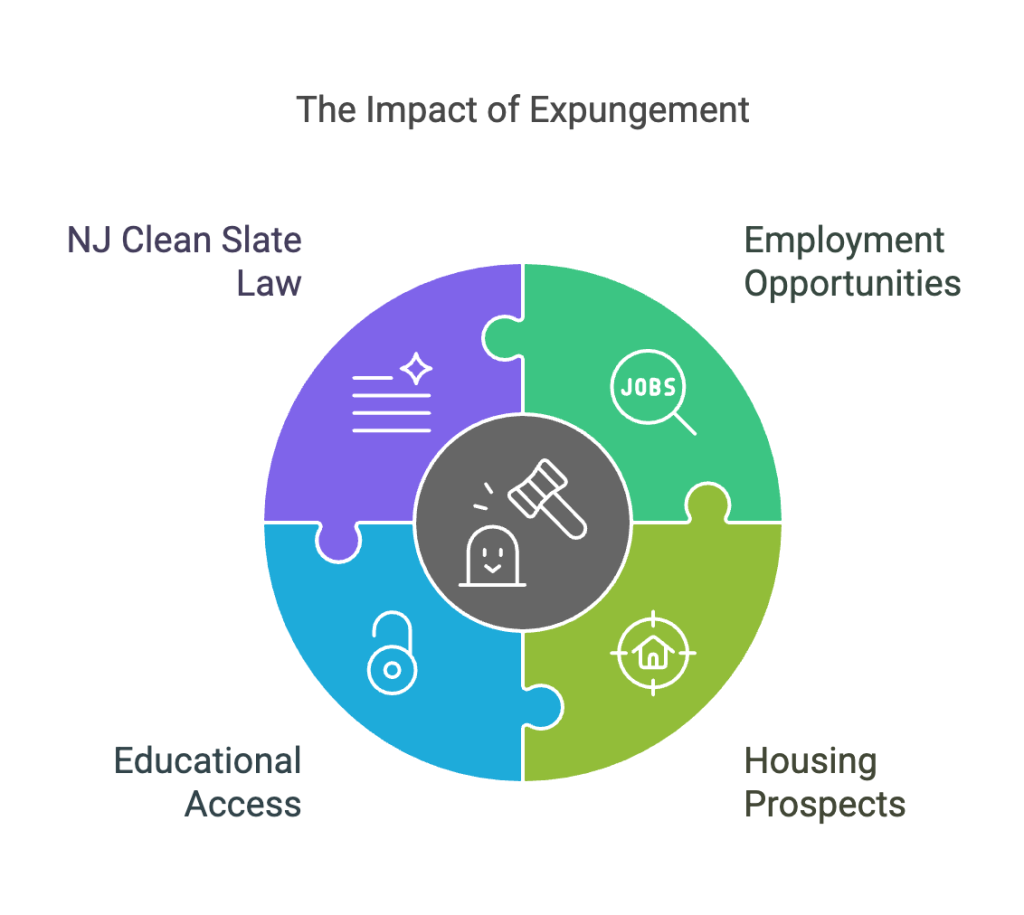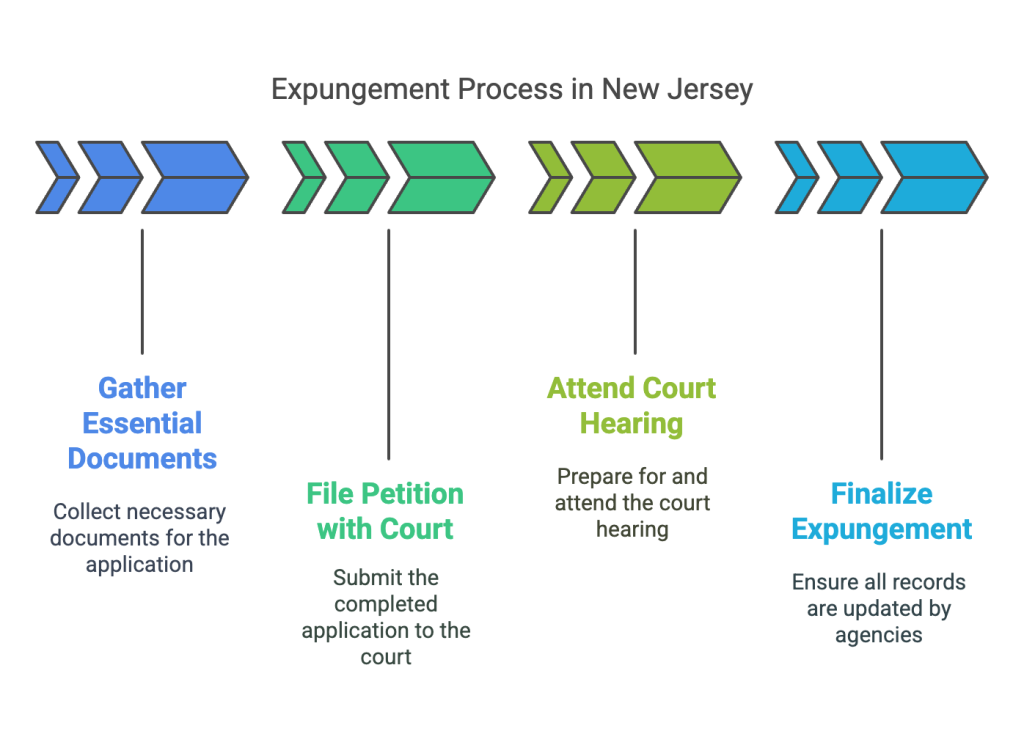Getting a fresh start in life can be challenging when past legal issues continue to shadow your prospects. Expungement offers an opportunity to clear your record and open doors to new employment possibilities. In New Jersey, expungement reforms have made this process more accessible for individuals looking to rebuild their lives. In this guide, we'll navigate the intricacies of New Jersey expungement for employment, focusing on the recent reforms, eligibility criteria, and steps necessary to clear your record. Whether you're seeking clarity on the NJ clean slate law, understanding expungement eligibility in NJ, or learning about sealing records, this comprehensive resource is here to help.
Key Takeaways
- Expungement in New Jersey helps erase or seal criminal records, making it easier to find jobs and achieve stable lives.
- Recent reforms in New Jersey have simplified expungement processes, reduced waiting periods, and expanded eligibility.
- Understanding your eligibility and gathering necessary documents are essential steps before applying for expungement.
- Filing the expungement petition accurately and preparing for possible court hearings are crucial in the process.
- Sealing records can be an alternative to expungement when dealing with non-conviction records, helping to limit access to your criminal history.
Introduction
Past legal issues can cast long shadows. For many, these shadows block paths to new jobs and stable lives. Expungement offers a chance to clear these barriers. It wipes or seals records, making it easier to step forward.
In New Jersey, expungement reforms are leveling the field. Recent changes make clearing records more feasible for many. This guide's aim is clear: to walk you through these reforms, show who's eligible, and outline the steps to clear your record.
Think about your career and life goals for a moment. Expungement might be the key to unlocking them. New Jersey's updated measures are crafted to simplify and widen the path to expungement. Ready to dive into the specifics and reclaim your future? Let's start the journey together.
Understanding Expungement: An Overview
Expungement means erasing a criminal record from public view. When a record is expunged, it's as if the crime never happened. This differs from sealing records, where the records still exist but access is restricted. Expungement allows you to legally say "no" when asked if you have a criminal record on job applications.
The benefits of expungement stretch beyond employment. A clean record can improve your chances of getting housing and educational opportunities. Employers often perform background checks. A clean slate can make the difference in hiring decisions.
The NJ Clean Slate Law aims to increase access to expungement. It allows people to expunge multiple offenses after ten years, offering a broad opportunity to clear records. These changes reflect a shift towards recognizing rehabilitation and giving individuals a fair chance at employment and other life opportunities.

Are you eligible for expungement under the new laws? How could clearing your record change your professional journey? These are questions worth exploring as you consider the path to a fresh start.
Recent Expungement Reforms in New Jersey
New Jersey has seen significant legal changes that simplify the expungement process. These reforms emerge from a need to address barriers faced by individuals with criminal records. The state recognized that previous laws were too restrictive, preventing many from getting a fair chance at employment and other opportunities.
The recent reforms have introduced several key changes. One of the most significant is the reduction in waiting periods. Previously, individuals had to wait many years before applying for expungement, but now some categories allow for earlier applications. This means you can get your records cleared sooner, enhancing your job prospects more quickly than before.
Eligibility criteria have also expanded. For example, certain non-violent offenses that were previously not eligible can now be expunged under the new laws. This broader eligibility makes it possible for more individuals to benefit from expungement, removing past mistakes from their history and opening doors to employment that were previously closed.
For job seekers, these changes offer a valuable pathway to overcome employment barriers. Employers can no longer access expunged records, which levels the playing field for qualified candidates who might otherwise be unfairly judged on past convictions. No longer does a past mistake have to be a life sentence affecting career opportunities.
If you’re considering expungement, it’s crucial to be aware of these updates. They represent a meaningful shift in how New Jersey handles criminal records and provide a real opportunity for individuals to rebuild their lives without the burden of a criminal past hanging over them. What new opportunities could open up for you with a clean slate? Consider this as you explore the possibilities that these reforms bring.
Expungement Eligibility in New Jersey
Understanding your eligibility for expungement in New Jersey is crucial before starting the process. The state's reforms have expanded access, but specific criteria must still be met.
General Criteria: To be eligible for expungement, you must meet certain conditions. Typically, you need to have completed all terms of your sentence, including probation, fines, and any community service. You also must not have any pending charges against you.
Specific Offense Considerations: Not all offenses are eligible for expungement. Generally, certain serious offenses like violent crimes and sexual offenses cannot be expunged. However, most misdemeanors and some felonies can be cleared. It’s important to review your record and consult legal resources to see where your case falls.
Waiting Periods: New Jersey has different waiting periods depending on the offense. For example, disorderly persons offenses might be eligible for expungement five years after completing your sentence. Felonies might require a ten-year wait. Some minor offenses may even be expunged after three years.
Checklists and Examples: A practical approach is to prepare a checklist. List down your offenses, their dates, and the completion date of your sentence. Then, compare these with New Jersey’s requirements. For instance, if you have a petty theft misdemeanor from six years ago and have no other convictions, you likely meet the criteria for expungement.
Understanding these elements can clarify whether moving forward with expungement is feasible. If you're unsure, consulting a legal expert can provide personalized guidance suited to your circumstances.
The Expungement Process: Step-by-Step
Preparing your expungement application doesn't have to be overwhelming. Start by gathering essential documents like your criminal records, case details, and identification. You'll need these to complete your petition accurately. Missing information can delay your application.
Once prepared, file your petition for expungement with the New Jersey court. This involves submitting your completed forms and any required fees. Filing accurately is crucial—incorrect submissions may lead to rejection or delays.
After filing, you might face a court hearing. Approach this with confidence. Review the details of your case, anticipate questions, and be ready to explain the positive changes you've made since the offense. Preparation can make a significant difference.
If your expungement is approved, finalize the process by ensuring all relevant government agencies update their records. This step is essential to fully clear your record. Doing so helps remove the barriers you face when seeking employment.

Taking these steps can open up new opportunities for you. Your persistence and attention to detail in navigating this process are vital. Are you ready to take control of your future?
Sealing Records in New Jersey
You might wonder how sealing differs from expungement. Both processes aim to limit access to your criminal history, but they aren't the same. Expungement effectively erases the record, whereas sealing hides it from public view but leaves it accessible to certain authorities.
Sealing records can be beneficial in specific scenarios. If your record includes accusations but not convictions, sealing might be the better option. It's also useful if full expungement isn't available to you. Sealing can prevent a potential employer from finding details in a standard background check.
The process of sealing a record in New Jersey involves a few steps. First, determine your eligibility. This often hinges on the nature of your record and any judicial outcomes. Next, gather necessary documents such as court dispositions and any paperwork related to completed terms or dismissed charges. Finally, file a petition with the court where your case was heard. Be prepared for a possible court hearing, and ensure every step is documented for smooth processing.
Taking this action can sometimes shift the balance during a job search. By understanding and using these processes, you enable yourself to move beyond past errors and focus on your future.
Overcoming Employment Barriers
Expungement can be a game-changer for job seekers. When employers see a clean record, your chances of getting hired increase. For many, expungement removes a significant barrier to employment. It allows you a fresh start and a chance to compete fairly in the job market.
Knowing your rights is crucial. The EEOC advises that employers must conduct background checks fairly. If your record is expunged, you aren't legally required to disclose the expunged offenses in most job applications. This means you can present yourself without the burden of past mistakes weighing you down.
Your narrative matters. When an employer asks about your background, be honest but strategic. Highlight how you've moved forward and what you've learned. Focus on your qualifications and how you can contribute to their company.
Employers are increasingly willing to hire those with expunged records, provided you show initiative and growth. Your story of reform can be as influential as your resume. Use expungement to open doors that were once closed and step into new opportunities with confidence.
Common Pitfalls
Incomplete Documentation
Failing to gather all necessary paperwork, such as your criminal history, fingerprints, and any required court documents, can delay or derail your petition. Ensure thorough preparation to avoid this mistake.
Misunderstanding Eligibility
Confusing expungement eligibility with sealing or other legal remedies can lead to missteps. Double-check that your offenses qualify for expungement under New Jersey law before proceeding.
Ignoring Waiting Periods
Applying for expungement before the mandatory waiting periods have elapsed will result in automatic denial. Ensure you satisfy all time-related criteria specific to your offense.
Not Addressing All Records
Neglecting to include all relevant offenses in your petition can lead to a partial or incomplete expungement, causing issues down the line. Review your entire criminal history to capture every eligible record.
Conclusion
Understanding the expungement process in New Jersey can be pivotal in advancing your career. Knowing the benefits of a clean record opens up possibilities in employment, housing, and beyond. Expungement reforms have expanded these opportunities, removing barriers many have faced.
Take charge of your future by exploring these changes and acting on them. Learn the steps, meet eligibility criteria, gather necessary documents, and file your petition. With these proactive moves, you can reshape your employment prospects.
For more detailed guidance, look at additional resources like GCheck blogs or legal advice tailored to your situation. These can offer ongoing support and insights on maintaining your cleared status as you move forward.
Frequently Asked Questions (FAQs)
How long does expungement take in NJ?
An expungement in New Jersey typically takes a few months, around three to six, from filing until completion. The timeline can vary based on court schedules and case complexities.
Can employers see expunged records in NJ?
No, employers in New Jersey cannot see expunged records. An expunged record is removed from public access, allowing you to legally state that the incident never occurred.
Are marijuana convictions expunged automatically in NJ?
Some minor marijuana offenses may be eligible for automatic expungement under recent legislation. It's best to verify if your case qualifies.
What crimes can’t be expunged in NJ?
Certain offenses, such as sexual offenses, homicide, kidnapping, and robbery, are not eligible for expungement in New Jersey.
How much does NJ expungement cost?
The filing fee for an expungement in New Jersey is $75. Additional costs may include attorney fees, if you choose legal assistance.
Do employers have to ignore sealed records in NJ?
Yes, employers must treat expunged records as though they do not exist and cannot use them in employment decisions.
Can expunged records affect professional licenses?
Typically, expunged records should not impact your professional licenses in New Jersey, but it’s wise to check with the specific licensing board.
How to check if your NJ record is sealed?
To verify if your record is sealed, you can contact the court where the expungement was filed or request a criminal history record review.
Can you expunge a felony in NJ?
Yes, certain felonies can be expunged in New Jersey, provided they meet the eligibility criteria and waiting periods.
Does expungement restore gun rights in NJ?
Expungement does not automatically restore gun rights. Gun rights restoration requires a separate legal process.
What is the waiting period for expungement eligibility in NJ?
The waiting period depends on the type of offense. For felonies, it generally ranges from five to ten years, while misdemeanors may have shorter waiting periods.
Can juvenile records be expunged in NJ?
Yes, juvenile records can often be expunged, though the eligibility rules and waiting periods may differ from adult records.
Is legal assistance required for expungement in NJ?
Legal assistance is not required but can be helpful. Many people choose to work with an attorney to navigate the expungement process smoothly.
What steps are involved in filing for expungement in NJ?
Filing involves preparing the petition, serving it to various parties, and attending a court hearing. Accurate paperwork and timely submission are crucial.
Definitions
Background Check
A background check is a review of a person’s criminal, financial, and sometimes employment history. Employers often use it during the hiring process to assess a candidate’s trustworthiness and reliability. If your record has been expunged, that information generally won't appear in a standard check.
Expungement
Expungement is the legal process that removes or hides a criminal record from public view. Once approved, it allows you to answer “no” when asked about a criminal history on most job applications. It can improve your chances of employment, housing, and education.
Eligibility Criteria
Eligibility criteria are the specific legal conditions you must meet to qualify for expungement. This typically includes completing your sentence, having no pending charges, and waiting a required period of time. Not all offenses meet these standards.
Sealing Records
Sealing records means restricting public access to your criminal record without erasing it. Certain government agencies may still see sealed records, but employers and landlords usually cannot. It's often used when expungement isn't available.
Employment Barrier
An employment barrier is any obstacle that makes it harder for you to get or keep a job. A criminal record is a common barrier. Expungement or sealing can help remove that hurdle, making it easier to compete fairly in the job market.
References
- https://www.nj.gov/governor/news/news/562024/20240415b.shtml
- https://ccresourcecenter.org/state-restoration-profiles/new-jersey-restoration-of-rights-pardon-expungement-sealing/
- https://www.nj.gov/governor/news/news/562025/20250331b.shtml
- https://www.nationalsecuritylawfirm.com/the-fight-against-delays-addressing-new-jersey-state-police-expungement-processing/

GCheck Editorial Team
Meet the GCheck Editorial Team, your trusted source for insightful and up-to-date information in the world of employment background checks. Committed to delivering the latest trends, best practices, and industry insights, our team is dedicated to keeping you informed.
With a passion for ensuring accuracy, compliance, and efficiency in background screening, we are your go-to experts in the field. Stay tuned for our comprehensive articles, guides, and analysis, designed to empower businesses and individuals with the knowledge they need to make informed decisions.
At GCheck, we're here to guide you through the complexities of background checks, every step of the way.





